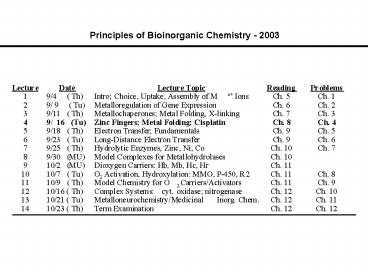Principles of Bioinorganic Chemistry 2003 - PowerPoint PPT Presentation
Title:
Principles of Bioinorganic Chemistry 2003
Description:
to Cancer Therapy. Idea. Discovery. Understanding & Invention. Serendipity. Creativity ... Cisplatin is highly effective against testicular cancer. ... – PowerPoint PPT presentation
Number of Views:181
Avg rating:3.0/5.0
Title: Principles of Bioinorganic Chemistry 2003
1
Principles of Bioinorganic Chemistry - 2003
2
Metallochaperones Metal Folding
PRINCIPLES
- Metallochaperones guide and protect metals to
natural sites - Chaperone and target receptor protein
structurally homologous - Metal-mediated protein structure changes affect
transcription - Metal-mediated protein structure changes affect
translation - Metal-induced protein structure changes also
activate enzymes - Metal-induced bending of DNA affects function
- Metal ionic radii and ML water bridging are used
to advantage
ILLUSTRATIONS
- Copper insertion into metalloenzymes
- Zinc finger proteins control transcription
- Ca2, a second messenger and sentinel at the
synapse - Cisplatin, an anticancer drug
3
Zinc Fingers - Discovery, Structures
A. Klug, sequence gazing, proposed zinc fingers
for TFIIIA, which controls the transcription of
5S ribosomal RNA. Zn2 not removed by EDTA. 9
tandem repeats. 7-11 Zn/protein.
Y or F X C X2,4 C X3 F X5 L X2
H X3,4 H X2,6
C
C
C
H
H
H
H
H
The coordination of two S and 2 N atoms from Cys
and His residues was supported by EXAFS ZnS,
2.3 Å ZnN, 2.0 Å. Td geometry. The protein
folds only when zinc is bound gt 1 of all genes
have zinc finger domains.
4
X-ray Structure of a Zinc Finger Domain
5
Structure of a Three Zinc-Finger Domain of Zif
268 Complexed to an Oligonucleotide Containing
its Recognition Sequence
6
The Specificity of Zinc for Zinc-finger Domains
Kd value 2 pM 5nM 2mM 3mM Metal ion Zn2 Co2
Ni2 Fe3
7
Metal Folding of Biopolymers
PRINCIPLES
- Metal-mediated protein structure changes affect
transcription - Metal-mediated protein structure changes affect
translation - Metal-induced protein structure changes also
activate enzymes - Metal-induced DNA structure changes effect
anticancer activity
ILLUSTRATIONS
- Ca2, a second messenger and sentinel at the
synapse - Cisplatin, an anticancer drug
8
Roles of Calcium in Protein Folding and Activation
Calcium at the synapse binds to the C2 domains
of synaptotagmin and helps to control
neurological signal transduction. Synaptotagmin
is the sensor for Ca2 influx.
Calcium also binds to calmodulin. As Ca2 levels
in the cell increase, calmodulin senses these
changes and binds to its target proteins with Kd
values of 10 - 100 nM or less. The following are
amino acid sequences from activated proteins
9
Synaptotagmin is a calcium sensor
Synaptotagmin III with Mg2 C2A-C2B crystal
structure Brunger and coworkers 1999
10
How does Ca2 activate synaptotagmin?
10-100 ?M Ca2 Phospholipid Binding
Dimerization via C2 domains?
mM Ca2 Binding to protein partner (syntaxin)
Change in Conformation?
Electrostatic Switch?
11
FRET
340
280
470
280
Ca2
C2A
C2B
C2B
C2A
12
Addition of Calcium Results in an Increase in
Energy Transfer
apo
mM Ca2
Garcia, R. A. Forde, C. A. Godwin, H. A. Proc.
Natl. Acad. Sci. U.S.A. 2000, 97, 5883-5888.
13
Other metal ions that can promote fusion also
confer this conformation change, but to a lesser
extent than does Ca2
Garcia, R. A. Forde, C. A. Godwin, H. A. Proc.
Natl. Acad. Sci. U.S.A. 2000, 97, 5883-5888.
14
Calmodulin - Properties and Structure
Properties 148 amino acids binds up to four
Ca2 ions. Primary structure conserved over many
species. Binds calcium in pairs of EF hand
domains. Calcium coordinated by 3 monodentate
Asp, 1 bidentate Glu, 1 peptide backbone
carbonyl, and 1 water molecule.
Seven-coordination favors Ca2 over Mg2.
Ca2 Kd, 10-6 to lt 10-7 M Mg2 Kd, 10-3 M
15
Structural Changes in Calmodulin upon Binding to
a Target Peptide Domain
Note how the target peptide is encapsulated
following conformational changes in the long
central helix
16
A Fluorescent Sensor for Calcium Binding in Cells
Can be used to correlate with synaptotagmin as
well as calmodulin response to Ca2 levels
17
Summary - Points to Remember
- In eukaryotes iron homeostasis is achieved by
regulating the concentrations of the transferrin
receptor and apoferritin at the translational
level. IRPs are the conformational switch and
utilize an Fe4S4 cluster to alter protein
structure. - A mercury resistance operon in bacteria
detoxifies R2Hg by lyase and reduction to Hg(0)
which volatilizes harmlessly out of the cell.
MerR is the sensor which undergoes a
conformational change upon Hg binding and
activates the genes at the level of
transcription. This topic was not covered in
class, but please read Chapter 6, Section 6.3.
18
Summary - Points to Remember, contd
- Zinc fingers form upon metal-binding to the apo
peptide domains and activate transcription of
thousands of genes. Evidence is accumulating that
zinc-binding domains also act as
metalloregulators in response to zinc levels in
the cell. - Synaptotagmin C2 domains are the calcium sensors
at the synapse responsible for Ca-dependent
signal transduction in helping to achieve
synaptic plasticity. - Calmodulin alters its structure upon calcium
influx into cells and activates many genes at the
transcriptional level. Calmodulin allows calcium
to serve as a second messenger in response to
signals at the cell surface, affording a signal
transduction pathway.
19
Syphilis
Bacterial infection
20
(No Transcript)
21
(No Transcript)
22
(No Transcript)
23
Factors Associated with Antitumor Drug
Development A. Serendipity gt 70001 in most
screens B. Perseverance 13 years between
laboratory and pharmacy C. Cost gt 750 M D.
Moral questions gene therapy E. The aversion
to metal-based pharmaceuticals
24
Idea
Creativity
Serendipity
Discovery
Intelligence
25
(No Transcript)
26
Cisplatin An Extraordinary Anticancer Drug
w/ cisplatin
Survival
w/o cisplatin
Cisplatin cis-diamminedichloroplatinum(II)
Years after Orchidectomy source I. Damjanov,
Scientific American, 1995
- Cisplatin is highly effective against testicular
cancer. It is also used to treat head, neck,
ovarian, and several other types of human tumors.
27
(No Transcript)































